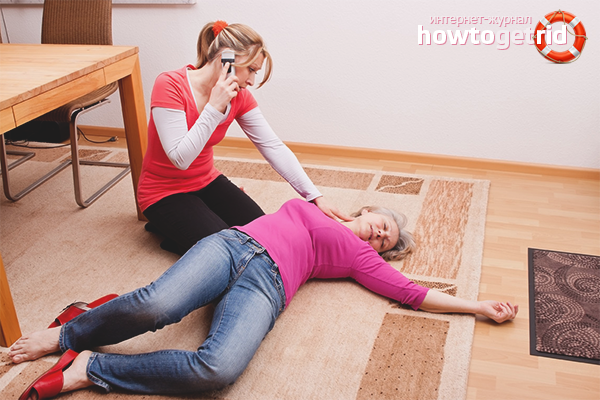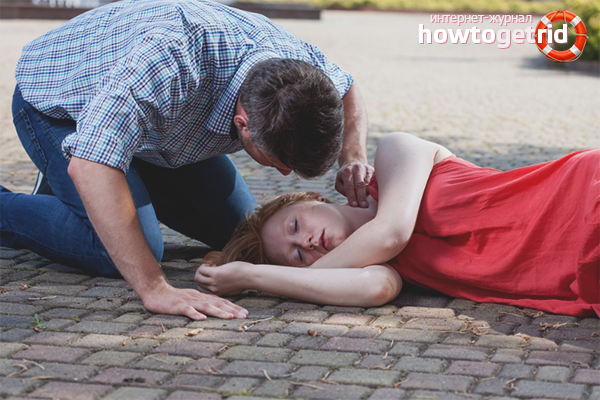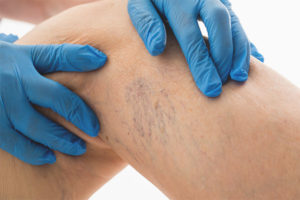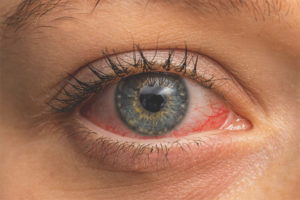The content of the article
Fainting can occur in any person, even in a completely healthy person. However, most often a short-term loss of consciousness occurs due to oxygen starvation of the brain, powerful emotional experiences, as a result of heart failure. Regardless of the reason, fainting is scary and dangerous. When a person loses control over your eyes and just falls, it’s difficult to maintain composure. In such a situation, you need to pull yourself together, stop the panic and begin to act quickly and competently.
Causes of fainting
Loss of consciousness can be triggered by anything. A single passing out may be the result of emotional shock or overstrain. But if a person loses consciousness regularly, he must certainly be examined. Among the causes that can cause fainting are the following:
- Hunger. Often a person faints due to a sharp decrease in blood sugar. This can happen after prolonged fasting, in the process of being on a strict diet, after serious physical exertion. Sugar is reduced below the permissible norm if a person does not eat carbohydrates or their quantity is sharply limited. This can be observed when women sit on the so-called protein diets. Before the onset of “hungry” fainting, the patient's breathing quickens, trembling begins, his hands shake, his legs are cottony, his head hurts. There is a feeling of causeless anxiety.
- Low hemoglobin. Loss of consciousness can occur with anemia and serious bleeding. A decrease in the number of red blood cells leads to a deterioration in the blood supply to the brain. If you feel dizzy when tilting and getting up off the bed, you should check your blood for hemoglobin levels. Before such a faint, a person becomes pale, he has a cold sweat. If loss of consciousness occurs due to low hemoglobin, fainting usually does not last long.
- Lack of air. When in a stuffy, closed room with a large number of people, there is an excess of carbon dioxide, which causes oxygen starvation. It is not difficult to get a person out of such a state - you just need to take him out into the fresh air and wipe your face with cold water.
- Overheat. Prolonged exposure to the sun can cause heat stroke. Thermal fainting is characterized by heart palpitations, redness of the skin, perspiration on the body. Before fainting, a person is usually thirsty. If the patient lost consciousness due to overheating, it must be transferred to a cool room, sprayed with cold water in the face.
- Disorders in the work of the heart. With various heart diseases and low blood pressure, oxygen starvation is very often recorded. As a result of this, loss of consciousness occurs.
- Overwork. When a person works for a long time without sleep and rest, the first symptoms of an approaching fainting begin to visit him - fatigue, pallor, dizziness, redness of the eyes, weak pulse, trembling hands, lowering blood pressure. Moreover, such symptoms can arise from both physical and mental labor. If you do not respond to body signals in time, loss of consciousness may occur. If a person faints from overwork, after returning consciousness, he needs rest and bed rest.
- Emotionality There are people who take everything to heart. Any nervous shock - fear, fear, pain, joy or unexpected news can lead to a surge of emotions and cause fainting.
- Poisoning. Loss of consciousness may occur due to intoxication of the body with drugs, alcohol, various chemical compounds.
In addition, expectant mothers often faint, especially in the first trimester of pregnancy. This is due to low pressure in a woman, hormonal changes in her body. A pregnant woman already does not feel very well - she feels nauseous, constant weakness, dizziness. And if the body is deficient in food or oxygen, it instantly reacts to this with a swoon.
Is it possible to feel the approach of fainting
Of course you can. The predecessors of loss of consciousness are tinnitus, black spots in front of the eyes, cold sweat, freezing of limbs, a feeling of stuffiness and lack of air, nausea, weakness. If you feel exactly these symptoms, you should immediately take a comfortable body position that will protect you from injuries in the fall. Lie down on your back and raise your legs to increase blood supply to the brain. If you are outside, you need to sit on a bus stop or bench and lower your head between your knees. At the same time, unfasten the top button of the shirt, loosen the tie, belt. When you feel a little better, you need to drink sweet tea or water.
First Aid Fainting
What to do if right before your eyes a person has lost consciousness? Well, if a doctor is nearby, he will be able to provide emergency care. But you don’t need to panic if you are face to face with a problem. Correct and consistent actions will lead the patient out of syncope.
- The first thing to do is to check a person’s heartbeat. If not, you need to do heart massage and artificial respiration.
- If the heartbeat is audible (and it can be very weak), a person who has lost consciousness must be laid with his back on a flat surface. Raise your legs, substituting a pillow or any other object under them. This position provides maximum blood flow to the brain. Never lower the patient’s head below body level.
- The patient's head must be turned to the side so that the tongue does not fuse - this may interfere with normal breathing.
- Unfasten the collar of the victim, remove the tie, ask the onlookers to move away. So you provide the patient with enough oxygen.
- To bring the patient to his senses, you can let him smell ammonia. Put a little ammonia on a cotton swab and hold it to your nose. If there is no ammonia at hand, use other liquids with a pungent odor - vinegar, alcohol, gasoline.
- If a pungent odor does not help, you can spray cold water on a person. In no case do not hit him on the cheeks - this is an absolutely useless way.
- After the patient came to his senses, he should not make sudden movements. You need to take a comfortable body position and drink a glass of hot sweet tea.
Do not lift the patient until he has regained consciousness, do not drag or shake him. If a person does not recover within 8-10 minutes, you need to call a doctor. Before the ambulance crew arrives, the doctor on the other end of the line may give some recommendations on how to bring a person to life.
Fainting Prevention
The loads should be moderate, but regular - take a walk in the fresh air with a calm step.This will allow you to normalize your blood pressure and saturate your body with oxygen. Refuse bad habits, do not neglect weekends and holidays, do not allow overheating, try not to be in tight and closed rooms and the risk of fainting will be minimal. In addition, consult your healthcare provider about taking nootropics, drugs that improve brain nutrition.
When a person faints in front of your eyes, it becomes scary. However, everyone should have first aid skills, even if the person is far from medicine. Often, first aid determines the further condition of the patient, and sometimes saves his life.
Video: Fainting Emergency











Submit